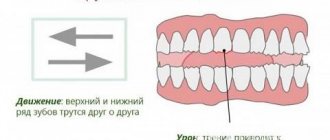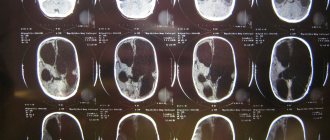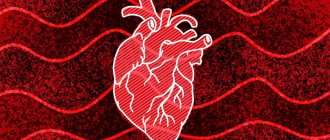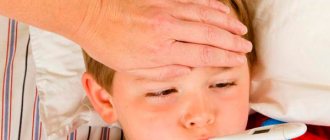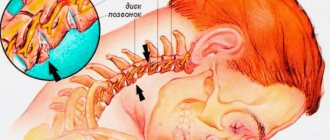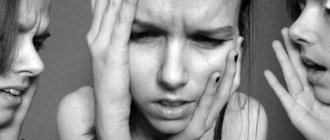25.08.2017
Vegetovascular dystonia (VSD) is a pathological condition that is characterized by disruption of the human autonomic nervous system. VSD is one of the common diseases that is diagnosed in people prone to being in stressful situations or experiencing physical and mental stress.
The disease is accompanied by a complex of unpleasant symptoms, one of which is insomnia. Insomnia with VSD manifests itself in all cases and worsens the patient’s quality of life.
The causes of poor sleep are varied, but they include those that relate to the nervous system. As a result of chronic lack of sleep, a person becomes irritable, lethargic, tearful and nervous. His performance decreases, his memory and thought process deteriorate. A person who suffers from insomnia is immediately noticeable; he is characterized by increased sensitivity and vulnerability. Insomnia with VSD is a common problem; you need to know why this happens and how to get rid of sleep disorders.
Vegetovascular dystonia: background information
VSD syndrome, or vegetative-vascular dystonia, is changes that occur in the presence of unfavorable factors in the autonomic nervous system, which cause numerous negative manifestations in different areas of the body. The syndrome is not included in the ICD10 classification. Despite this, a large number of people suffer from it, to varying degrees.
Advice! Patients who live in constant stress, have experienced a traumatic situation, have an impressionable character, an anxious personality type, and are prone to hypochondria are susceptible to this condition. Hereditary factors, overwork and chronic diseases can become an impetus for the development of VSD.
Physiotherapy
To combat the problem of lack or disturbance of sleep due to vascular dystonia, various physiotherapy procedures are often used that restore blood circulation and calm the nervous system. Some manipulations are done only in a hospital or in specialized institutions, while others are also available at home. Physiotherapy is prescribed by a physiotherapist, taking into account the symptoms and condition of the patient.
The most common treatments for insomnia are described below:
- Massage helps improve blood circulation in the brain.
- Magnetotherapy. Exposure to a magnetic field normalizes the oxygen supply to the brain.
- Electrosleep. By influencing the brain with low frequency currents, they cause a decrease in the activity of the nervous system and a state similar to sleep occurs.
- Darsonvalization helps reduce the symptoms of vegetative-vascular dystonia, including insomnia.
- Electrophoresis using sedatives. The medicine penetrates the blood and normalizes the functioning of the nervous system, reducing excitability and relieving attacks of neurosis.
For greater effect, you should do 10-15 sessions. Only a specialist can determine what the health problems are and what treatment is best suited in a particular case. !
Insomnia that occurs with VSD
Sleep disorder accompanies almost all patients suffering from dystonia. This can happen for several reasons: disturbances in the functioning of internal organs, the presence of problems in the psychological sphere. Often, VSD and insomnia occur against the background of depression, neuroses, and phobias.
Prerequisites for the development of the syndrome
Insomnia with vegetative-vascular dystonia does not arise out of nowhere and is always a symptom of some kind of malfunction in the functioning of various organs or the psyche. In some cases, sleep disturbances are caused by a combination of such factors.
Doctors distinguish two main groups of prerequisites that affect the process of falling asleep and periods of wakefulness. These are somatic and psychological factors. We should consider them in more detail.
Somatic
These reasons include diseases of the cardiovascular system, as well as pathologies of the thyroid gland and adrenal glands. Due to hormonal disorders, the regulation of the process of falling asleep suffers, and due to the low hemoglobin content in the blood and insufficient oxygen enrichment, tachycardia can occur, and there are pressing pains that do not allow the patient to fall asleep peacefully.
Psychological
This type of reason is more common than somatic causes. The fact is that patients with VSD, due to changes occurring in the body, are more susceptible to stress, panic attacks, neuroses and depressive states. All this leads to the fact that a person either cannot fall asleep for a long time, suffering from worries and fears, or the sleep is shallow and disturbing, the patient often wakes up in the middle of the night.
Signs of insomnia
Insomnia can be characterized by the following manifestations:
- The simplest and most famous option is that a person cannot sleep at night. This condition is systematic, repeating several times a week, in severe cases - daily.
- During the day the patient feels weak and drowsy, but in the evening these symptoms disappear. When sleep time comes, a person does not feel tired and cannot fall asleep for a long time.
- Restless sleep, which is constantly interrupted due to extraneous sounds or disturbing dreams.
- The patient regularly wakes up at about 3 o'clock in the morning, after which he cannot sleep for a long time.
- The duration of sleep itself is reduced. If before the onset of VSD a person needed to sleep at least 9 hours, then with the onset of the disease, the time of night rest is reduced to 5-6 hours.
All of the above manifestations are signs of insomnia. If at least one of them is detected, you should consult a doctor and begin treating this condition.
Consequences of the disorder
Regardless of whether insomnia is caused by VSD or vice versa, the disorder must be eliminated. If you do not pay attention to constant disruptions in night rest, you can very quickly worsen a vegetative-vascular disease. This leads to unpleasant complications, such as:
- increased irritability, aggression;
- memory losses;
- hallucinations;
- disruption of the cardiovascular system, tachycardia;
- tremor of the limbs, muscle and joint pain, cramps;
- malfunction of the immune system;
- decrease in body temperature;
- developmental delay;
- obesity;
- diabetes mellitus type 2.
The longer you delay treating your insomnia, the more it will get worse. At the first and simplest stage, a person only has problems falling asleep - to immerse himself in the arms of Morpheus, he needs from 40 minutes to several hours.
At the second stage, sleep itself is disrupted, it becomes intermittent, superficial, of poor quality, and the patient begins to suffer from nightmares.
The last stage of the disorder is quite realistic hallucinations, which most often occur at night. To avoid such complications, you need to consult a specialist in time.
Consequences of sleep problems with VSD
Constant lack of sleep mixed with daytime fatigue has a devastating effect on the human body. Persistent vasospasm occurs, and dysfunction of vital organs increases.
All this can lead to such serious consequences as a heart attack or stroke. This is a direct path to disability or death.
Patients often suffer from decreased concentration, decreased performance, and chronic fatigue. Patients' limbs begin to twitch involuntarily, the pulse increases, and dizziness and fainting may begin due to vascular insufficiency. That is why it is extremely important to treat insomnia by eliminating the causes that cause it.
Clinical manifestations of VSD
Autonomic dysfunction can manifest itself in different ways.
Most often patients experience:
- hyperventilation syndrome;
- cardiovascular syndrome;
- hyperhidrosis (increased sweating);
- irritable bowel syndrome and other gastrointestinal disorders;
- cystalgia (frequent and painful urination in the absence of pathologies of the urinary system);
- sexual disorders;
- violation of thermoregulation (slight but steady increase in temperature);
- sleep disorders (insomnia).
Proper treatment of insomnia with vegetative dystonia
For many patients, treatment for insomnia involves taking sleeping pills and sedatives. However, these are not the only methods that can alleviate the patient’s condition and eliminate insomnia.
For this condition, folk recipes, physiotherapy, and lifestyle correction are used. Let's look at them all in more detail.
The benefits and harms of sleeping pills for VSD
Taking sleeping pills for insomnia at first glance seems to be the simplest solution to the problem. However, doctors believe that this method is not only ineffective, but can also do more harm than good.
Insomnia occurs due to dysfunction of internal organs or constant stress. In this case, sleeping pills will help the person fall asleep, but the underlying causes of sleep disturbances will remain. Over time, the patient may need to increase the daily dose of the medication, since small dosages are not always effective. All this leads to addiction, when the patient cannot fall asleep without taking sleeping pills.
This treatment method will not only not solve the problem of insomnia, but can also lead to additional complications.
This treatment can be effective if used in combination with other techniques, such as psychotherapy, sedative herbal teas, massage and physiotherapy. This is evidenced by positive reviews from both patients and doctors.
Attention! Anti-insomnia pills will help at the initial stage. Subsequently, with successful correction of this condition, their dosage must be gradually reduced to a minimum, and then such medications should be completely abandoned.
Remedies proven over centuries
Infusions and mixtures based on sedative herbs are effective in combating sleep disorders. However, you should not self-medicate. Before using them, you should consult your doctor to avoid allergic reactions and other side effects.
The most effective are the following:
- Calming charges. They can be bought ready-made at the pharmacy. They can be either in the form of dried raw materials or packaged in filter bags. They should be used according to the instructions, and if negative reactions occur, immediately inform your doctor.
- Infusion of wine and dill. For a liter of red wine (necessarily high-quality), take 100 g of dill seed. The ingredients are mixed in a saucepan and simmered over low heat for no more than 20 minutes. The resulting decoction is used 2 teaspoons before bedtime.
- Dry crushed valerian root in the amount of 1 teaspoon is poured with a glass of boiling water. The resulting infusion is wrapped in a towel and allowed to brew for at least an hour. Take half a glass before bedtime.
- A method that is suitable for patients of all ages. If you have problems falling asleep, dissolve a teaspoon of honey in a glass of warm milk and drink. It should not be used by people who are allergic to milk protein or bee products.
It is important to know! The advantage of traditional medicine is safety, non-toxicity, effectiveness and no risk of overdose. In advanced cases, it will not be possible to normalize the patient’s condition with its help alone, but in complex treatment, traditional methods show good results.
Psychotherapy sessions
One of the most effective methods, it is only important to choose a competent specialist. With this treatment, the doctor will work together with the patient on all the patient’s fears and psychological traumas and teach him how to cope with traumatic situations. The number of sessions is always determined individually, based on the complexity of the problems and the patient’s condition.
The effectiveness of physiotherapy
This treatment method is not the main one, but is aimed at alleviating the patient’s condition in the presence of concomitant diseases. The following methods can be used:
- Massage. This is especially true for working on the cervical and collar areas. This will improve blood flow and supply the brain with nutrients and oxygen.
- Relaxing baths. They add collections of sedative medicinal plants; such treatment should not last more than 20 minutes. Performed several times a week after consultation with a doctor.
- Acupuncture. Thanks to this method, it is possible to stimulate energy points on the body, which has a positive effect on chronic diseases. Patients become calmer and their resistance to stress increases. This procedure should only be performed in a medical facility by a certified physician.
Professional help
Doctors cannot say unequivocally which drugs help overcome VSD; there are only drugs to relieve symptoms. In the most severe cases, not only medication assistance is required, but also work with a psychiatrist, since sleep disorders can be triggered by a disturbance in the patient’s emotional background.
Doctors can prescribe sleeping pills that have sedative properties for insomnia due to VSD. It will also be useful to take medications that normalize the functioning of the cardiovascular system. Particular attention is paid to restorative therapy; it helps to increase the body's protective functions.
For the most severe forms of insomnia, tranquilizers are prescribed, and painkillers will help relieve pain. However, it will be much better if you manage to do without such strong medications, since they have many contraindications.
Additional Drug Alternatives for Insomnia
To cope with insomnia and anxiety, many patients are prescribed glycine, a safe medication that improves the functioning of the nervous system and brain, and reduces the risk of vascular damage. In addition, all patients are advised to give up bad habits, normalize their daily routine, and avoid excessive physical and mental stress.
Other sleep disorders in VSD and general methods of prevention In addition to insomnia, another problem often arises - a person cannot get enough sleep, despite long and deep sleep. He constantly feels drowsy and weak. To reduce the risk of any type of sleep disorder, you should follow some preventive measures:
- Food. You should exclude all foods rich in caffeine from your diet. This could be tea, coffee, energy drinks. You should also reduce the amount of chocolate you consume. The last meal should be taken at least 3 hours before going to bed, it should be a light meal, the best option is fermented milk drinks or yogurt.
- Time before bed. For people suffering from sleep disorders, it is extremely important when preparing for a night's rest not to watch TV or play computer games, as these actions will contribute to nervous tension and prevent you from falling asleep peacefully. It is best to take a leisurely evening walk in the fresh air, take a warm, relaxing bath, and drink a glass of milk with honey. Before going to bed, it is recommended to ventilate the bedroom so that the room is not too warm and stuffy.
- Before going to bed, you do not need to engage in mental or physical work, this can lead to difficulties in the process of falling asleep, since the body will be in a state of wakefulness.
- You need to go to bed at the same time, adhering to this schedule every week.
- It is extremely important to avoid stress before bed. You should not lie in bed, make plans for the next day or scroll through unpleasant thoughts or conversations in your head.
All of the above recommendations will help improve the process of falling asleep and effectively combat insomnia. Sleep disturbances with VSD are a common problem for many patients. When the first symptoms occur, you should not self-medicate and try to correct the situation with sleeping pills. It is best to consult a doctor as soon as possible, who will conduct the necessary examinations and prescribe the most effective treatment.
Alternative to medicines
If insomnia with VSD torments you periodically or all the time, you can cure it with the help of homeopathic remedies. They have a minimum of contraindications and are suitable for all patients and even children. In addition, such medications are not addictive and do not have a negative effect on the body.
Modern manufacturers offer broad-spectrum drugs that will help normalize sleep, get rid of nervous tension, anxiety, aggression and other manifestations of VSD. Let's consider what can be taken to normalize the condition.
- "Sonylux". The product was developed by Russian scientists. In 2020, clinical trials were carried out, after three months of studying the effectiveness of the drug, it was proven that in 97% of cases it stabilizes sleep, eliminates headaches and anxiety. The slow-wave sleep phase of the subjects occupies 75-80% according to the results of the electroencephalogram, which corresponds to the norm. All study participants had manifestations of vegetative-vascular dystonia, anxiety and increased nervous excitability. After completing the full course, the patients' condition returned to normal. Such results were ensured by the composition of “Sonylux”, which includes:
- Alishan gaba is a natural component that improves memory and blood circulation, actively fights insomnia, and eliminates nervous disorders;
- lofant is a plant that has bactericidal and tonic properties, reduces blood pressure, prevents aging and relaxes the nervous system;
- beaver stream – stabilizes the functioning of the cardiovascular system, calms the nervous system, strengthens the body, acts as an antispasmodic, helps fight migraines;
- a collection of 32 medicinal herbs - has a calming and relaxing effect on the entire body, helps you fall asleep faster, normalizes blood pressure and heart rate, eliminates neuroses and anxiety.
- DreamZzz. The homeopathic remedy relieves stress, anxiety, chronic fatigue and normalizes sleep, so it is perfect for patients suffering from VSD. The drug is based on natural ingredients that effectively eliminate nervous disorders. They are necessary to stabilize the functioning of the cardiovascular system, relieve spasms and psychological stress. Plant extracts reduce blood pressure, have bactericidal and restorative properties, and a collection of 32 herbs helps you quickly fall asleep and relax. After regular use of the medicine you will get the following results:
- the period of falling asleep will become easy and short;
- your sleep will be sound, waking up at night and nightmares will be a thing of the past;
- anxiety and aggression will disappear;
- you will stop feeling chronic fatigue;
- the frequency of nervous strains will be significantly reduced;
- your mood and vitality will improve.
Find the cause and eliminate it
The causes of insomnia can be different. There may be physical causes behind your psychological disorder. For example, you drink coffee, cola, tea, energy drinks. You need to find out why you can't sleep, maybe the mattress is too hard, it's too hot, it's too loud, etc.
Or maybe you have a psychological crisis, problems at work, stressful events that you take with you to bed.
This problem must be solved. But doctors do not recommend immediately resorting to the use of sleeping pills. These drugs very quickly become addictive to the body; if we use them, it is in very rare, extreme cases. And since we know about the consequences, that they cause more harm than good, it is better to forget about them altogether and try to solve the problem on our own with the help of our advice.
How to identify symptoms of VSD
Insomnia during the course of dystonia is expressed by some characteristic symptoms, thanks to which it is possible to accurately recognize the disease. Some patients characterize insomnia by a long absence of falling asleep, others say that they have no problems falling asleep, but at night they often wake up due to nightmares.
If insomnia develops with VSD due to stress, the patient will notice the following symptoms:
- shallow sleep, which can be interrupted by any noise or bright light;
- lack of opportunity for the patient to get enough sleep;
- dizziness and drowsiness during the day;
- a person really wants to sleep, but he cannot fall asleep;
- headaches;
- tremor;
- development of nightmares;
- frequent heartbeat.
Insomnia often develops due to diseases of the central nervous system, namely depression, asthenia, and neurosis. Such problems prevent the human body from relaxing, which prevents him from falling asleep quickly and soundly.
If insomnia has developed as a result of nervous disorders, the following symptoms will indicate this:
- difficulty falling asleep - sometimes you have to lie in bed for more than 2 hours to fall asleep;
- complete lack of sleep at night;
- frequent awakenings, which indicates a person’s shallow sleep, due to which it is impossible to get a good night’s sleep.
Sometimes insomnia during VSD occurs due to somatic diseases, namely:
- asthma;
- apnea;
- arthritis;
- prostate hypertrophy;
- Parkinson's disease.
In some cases, nighttime sleep disturbance occurs due to medications that the patient should take to cure autonomic dysfunction. Also, the development of the disease is caused by frequent drinking of alcohol, which completely eliminates the desire to sleep.


